|
|
|
Sort Order |
|
|
|
Items / Page
|
|
|
|
|
|
|
| Srl | Item |
| 1 |
ID:
152021
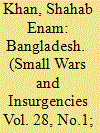

|
|
|
|
|
| Summary/Abstract |
Bangladesh is currently facing an incremental growth of radicalization. This radicalization can be traced back to the country’s early post-Independence years. Over time, political violence, ideological clashes between secular and right-wing ideologies, and weak governance have created conditions for the growth of radical Islam. The public rhetoric on corruption, weakening of democratic institutions, inadequate law enforcement agencies, fragile justice delivery system, fledgling educational and social institutions and growing unemployment provides further space for alternative narratives by extremist ideologues. Home-grown extremist outfits have received ideological and tactical supports from transnational terrorist network such as Islamic State (IS) and Al-Qaeda in Indian Subcontinent (AQIS), but only in a limited manner. The supply and demand side of radicalization in Bangladesh has not yet been addressed by actors such as the government, private sector, civil society and media. The failures in multiple sectors in the state governance have led to a situation where IS and AQIS now see Bangladesh as a potential ground for exerting their supremacy as flag bearers of radical forms of Islam.
|
|
|
|
|
|
|
|
|
|
|
|
|
|
|
|
| 2 |
ID:
170538
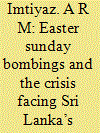

|
|
|
|
|
| Summary/Abstract |
This paper primarily examines the Easter Sunday bombing plotted and executed by a group of Sri Lankan Muslims and post-war Sri Lankan conditions among Sri Lankan Muslims, also known as Moors. The article will attempt to argue that (a) the post-war violence and organized Islamophobia among non-Muslim communities in general and the Sinhalese in particular increased fears and distrust among Sri Lankan Muslims in general; and (b) state concessions to Muslim political leaders, who supported successive Sri Lankan ruling classes from independence through the defeat of the Liberation Tigers of Tamil Eelam (LTTE) in 2009, have meant an isolation of the community from the other two main ethnic communities. The concessions that the Muslim community has won actively helped the Muslim community to be proactive in its religious practices and thus paved the way for exclusive social and political choices. The rise of Islamic movements and mosques in the post-1977 period galvanized Muslims. In time this isolation has been reinforced by socio-religious revival among Muslims whose ethnic identity has been constructed along the lines of the Islamic faith by Muslim elites. Despite this revival it has been clear that the Muslim community has been reluctant to use Islamic traditions and principles for peace building, which could have helped to ease tensions, brought about by the 30-year-old ethnic conflict. Finally, some pragmatic ways to ease tensions between Muslims and non-Muslims in the greater discipline of conflict resolution are explored using traditions within Islam.
|
|
|
|
|
|
|
|
|
|
|
|
|
|
|
|
| 3 |
ID:
112174
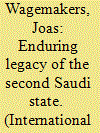

|
|
|
|
|
| Publication |
2012.
|
| Summary/Abstract |
The concept of al-wala? wa-l-bara? (loyalty to Islam, Muslims, and God and disavowal of everything else) has developed in various ways in Wahhabi discourse since the 19th century. This can partly be ascribed to the civil war that caused the collapse of the second Saudi state (1824-91) and the lessons that both quietist and radical Wahhabi scholars have drawn from that episode. In this article, I contend that Wahhabi contestations of al-wala? wa-l-bara? can be divided into two distinct trends-one social and the other political-and that both show the enduring legacy of the second Saudi state, which can still be discerned in Wahhabi scholarly writings on the subject of al-wala? wa-l-bara? today.
|
|
|
|
|
|
|
|
|
|
|
|
|
|
|
|
| 4 |
ID:
159177
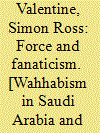

|
|
|
|
|
| Publication |
London, C Hurst and Co., 2015.
|
| Description |
xxiii, 362p.hbk
|
| Standard Number |
9781849044646
|
|
|
|
|
|
|
|
|
|
|
|
Copies: C:1/I:0,R:0,Q:0
Circulation
| Accession# | Call# | Current Location | Status | Policy | Location |
| 059401 | 297.8/VAL 059401 | Main | On Shelf | General | |
|
|
|
|
| 5 |
ID:
190892
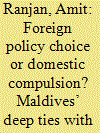

|
|
|
|
|
| Summary/Abstract |
This paper analyses how Maldives’ close ties with Saudi Arabia have affected its relations with other countries from Middle East Asia. Following the footsteps of Saudi Arabia, Maldives severed its diplomatic relations with Iran in 2016 and with Qatar in 2017. The paper discusses the economic investments Riyadh has made to develop civic infrastructure in the island nation. However, more than diplomatic ties and economic investments, close relations between Malé and Riyadh have affected the Island state’s society. There is a spread of religious obstructionism in Maldivian society, for which several outside scholars and Maldivians blame Saudi Arabia. Finally, the paper briefly discusses Maldives’ ties with Middle East countries other than Saudi Arabia.
|
|
|
|
|
|
|
|
|
|
|
|
|
|
|
|
| 6 |
ID:
034062
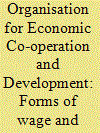

|
|
|
|
|
| Publication |
Paris, O.E.C.D.Publications, 1970.
|
| Description |
165p
|
|
|
|
|
|
|
|
|
|
|
|
Copies: C:1/I:0,R:0,Q:0
Circulation
| Accession# | Call# | Current Location | Status | Policy | Location |
| 007463 | 658.321/ORG 007463 | Main | On Shelf | General | |
|
|
|
|
| 7 |
ID:
118767


|
|
|
| 8 |
ID:
173550


|
|
|
|
|
| Summary/Abstract |
Religious supremacy has been one of the most important factors in West Asia since the inception of Abrahamic religions. As each religion held its supremacy for a period in time, it gave rise to renaissance within the religion.
|
|
|
|
|
|
|
|
|
|
|
|
|
|
|
|
| 9 |
ID:
115253
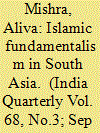

|
|
|
|
|
| Publication |
2012.
|
| Summary/Abstract |
Islamic fundamentalism is a multifarious movement with diverse manifestations, components, and contextual historical and societal conditions. While the radical Islamists, for instance, seek to impose change from above through holy wars, others pursue a bottom-up approach to bring about the re-Islamisation of the society through extensive networks of social activity. Regardless of their particularistic properties, all Islamist groups, however, share a common goal of establishing an Islamic order (nizam Islami) for the actualisation of Muslim life. The fundamentalists may not have registered considerable success in electoral terms, but they continue to dominate political discourse because their message is capable of attracting a broad spectrum of society. On the basis of a broad understanding of Islamic fundamentalism as a religio-political movement, this article attempts a comparative study of the phenomenon in Pakistan and Bangladesh, two leading Muslim states of South Asia. By examining the historical and social context, internal political developments including the role of state in promoting religious agenda and the varying impact of extraneous factors, the article argues that while Islamic fundamentalism in Bangladesh is containable, accomplishing it in Pakistan will be difficult because of the state appropriation of Islam in political discourse guaranteeing the movement's staying power.
|
|
|
|
|
|
|
|
|
|
|
|
|
|
|
|
| 10 |
ID:
174894


|
|
|
|
|
| Summary/Abstract |
The history of the Sheikdom of al-Zubayr is an essential aspect of Gulf history as it closely relates to significant events that have helped shape the region. Due to the relative lack of research into this important sheikhdom, this article makes a significant contribution to the historical narrative of al-Zubayr focusing on its links between its sister city states of Najd. This paper notably investigates the political relationship between al-Zubayr and the Najd city states of Harma and Huraymila. In doing so, the article shows how this sheikhdom, has been socially, culturally and politically shaped by the Najdi city states. Hence, the article argues that al-Zubayr also occupies a central position in the political and religious landscape of that time as it acted as a de facto refuge for many powerful Najdi clans during the rise of the Saudi/Wahhabi movement. Based on a review of several Arabic primary sources, it is shown how the Najdi city states’ political conflicts were exported to the sheikhdom of al-Zubayr which witnessed a particularly violent political history shaped by the various conflicts between two main Najdi factions, Harma and Huraymila.
|
|
|
|
|
|
|
|
|
|
|
|
|
|
|
|
| 11 |
ID:
146349
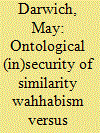

|
|
|
|
|
| Summary/Abstract |
It has long been argued that identity matters in international relations. Yet how identity impacts enmity and conflict among states remains the subject of debate. The existing literature asserts that differences in identity can be a source of conflict, whereas convergence and similarity lead to cooperation. Nevertheless, empirical evidence from the Middle East has long defied this hypothesis. The Kingdom of Saudi Arabia, which prides itself on being an Islamic model and claims Islamic leadership, has opposed the rise to power of Islamist movements in the Middle East. To address this paradox, this article builds on the growing literature on ontological security to propose a theoretical framework explaining how similarity can generate anxiety and identity risks. This framework, I argue, moves beyond traditional regime security approaches to reveal that security is not only physical but also ontological. I then illustrate the argument through a comparison of Saudi identity risks in the wake of the Iranian revolution (1979) and the ascendance of the Muslim Brotherhood to power in Egypt (2012). Ultimately, these cases provide intriguing insights into foreign policy behavior during critical situations.
|
|
|
|
|
|
|
|
|
|
|
|
|
|
|
|
| 12 |
ID:
149542
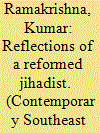

|
|
|
|
|
| Summary/Abstract |
On 29 August 2012, a rehabilitated former senior member of the Jemaah Islamiyah (JI) terror network, Wan Min Wan Mat, delivered a lecture to a group of Malaysian counter-terrorism practitioners in which he sketched out the ideological rationale and aims of the JI network, unpacked in some detail its recruitment and indoctrination philosophy and methodology and also examined what in his personal view are potentially useful strategies for rehabilitating JI militants or preventing the further dissemination of JI extremist ideas. This article examines and evaluates some of the key insights made by Wan Min in his lecture, and argues that his musings are more than mere historical interest in that they have direct relevance to the current struggle against the latest incarnation of the continually evolving violent jihadist threat in Southeast Asia and globally, namely the Islamic State of Iraq and Syria (ISIS or IS). The central reason for this is that the same broad ideology that animated JI — Salafi Jihadism — basically motivates ISIS as well. Hence, even allowing for dissimilarities in time and space, Wan Min’s insights about JI could well provide useful pointers for counter-terrorism practitioners and specialists dealing with the ISIS threat today.
|
|
|
|
|
|
|
|
|
|
|
|
|
|
|
|
| 13 |
ID:
134120
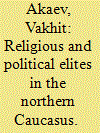

|
|
|
|
|
| Publication |
2014.
|
| Summary/Abstract |
This article highlights the main factors relating to the formation of the religious and political (Islamic) elites in the Northern Caucasus caused by Gorbachev's perestroika, the collapse of the Soviet Union, the reforms conducted in Russia, the creation of an ideological vacuum, and the birth of market relations. The sociocultural context that formed has given rise to an Islamic revival, the penetration of Salafi (Wahhabi) ideas into the region, and the formation of a neo-clergy that is not only claiming a leading role in the religious life of Muslims, but also active participation in politics, right down to preparing a state coup.
|
|
|
|
|
|
|
|
|
|
|
|
|
|
|
|
| 14 |
ID:
154694


|
|
|
| 15 |
ID:
139058
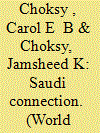

|
|
|
|
|
| Summary/Abstract |
The Kingdom of Saudi Arabia does not have problems with other creeds or sects,” then Prince (now King) Salman claimed in a conversation with outgoing US Ambassador James C. Oberwetter in March 2007. Salman went on to stress: “Terrorism and fanaticism have done more harm to Islam than anything else.” This is the party line of the House of Saud—that, in the words of its last king, Abdullah, Saudi Arabia stands “in the face of those trying to hijack Islam and present it to the world as a religion of extremism, hatred, and terrorism.” Such statements are meant to reassure, but they ring hollow in the face of evidence that the roots and spread of violent Sunni jihad lead back to Saudi Arabia and its Wahhabi-centered clerical establishment.
|
|
|
|
|
|
|
|
|
|
|
|
|
|
|
|
| 16 |
ID:
063024
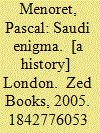

|
|
|
|
|
| Publication |
London, Zed Books, 2005.
|
| Description |
xi, 257p.
|
| Standard Number |
1842776053
|
|
|
|
|
|
|
|
|
|
|
|
Copies: C:1/I:0,R:0,Q:0
Circulation
| Accession# | Call# | Current Location | Status | Policy | Location |
| 049787 | 953.8052/MEN 049787 | Main | On Shelf | General | |
|
|
|
|
| 17 |
ID:
156629
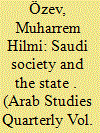

|
|
|
|
|
| Summary/Abstract |
This article considers religious, social, political, and economic dimensions of the
Saudi-Wahhabi state imagination. Since the inception, the Saudi state has relied on two
main pillars: the monarchy and Wahhabism, which have been in a symbiotic relationship.
In time, the state imagination in Saudi Arabia has been determined and reconstructed
by factors like Wahhabism, monarchism, rentierism, internal and international political
and economic obligations, and modernization efforts imposed by being a “nation state.”
Those factors made Saudi Arabia a sui generis state. The legitimacy of the monarchy has
been ensured through tribalism and, on a larger scale, religion. Foreign aid, booties, oil
revenues, and, on a rather insignificant scale, tax revenues have created a material infrastructure
to build citizenship.
|
|
|
|
|
|
|
|
|
|
|
|
|
|
|
|
| 18 |
ID:
139017
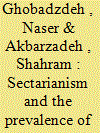

|
|
|
|
|
| Summary/Abstract |
The current sectarian conflicts in the Middle East did not arise solely from renewed geopolitical rivalries between regional powers. They are also rooted in a solid, theological articulation proposed by classic Islamic political theology. The exclusivist approach, which is a decisive part of the political, social and religious reality of today’s Middle East, benefits from a formidable theological legacy. Coining the notion of ‘othering theology’, this paper not only explores the ideas of leading classical theologians who have articulated a puritanical understanding of faith, but also explicates the politico-historical context in which these theologians rationalised their quarrels. Given the pervasive presence of these theologies in the contemporary sectarian polemics, the study of classical othering theology is highly relevant and, indeed, crucial to any attempt to overcome sectarianism in the region.
|
|
|
|
|
|
|
|
|
|
|
|
|
|
|
|
| 19 |
ID:
057693
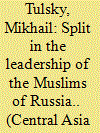

|
|
|
| 20 |
ID:
092863


|
|
|
|
|
|
|
|